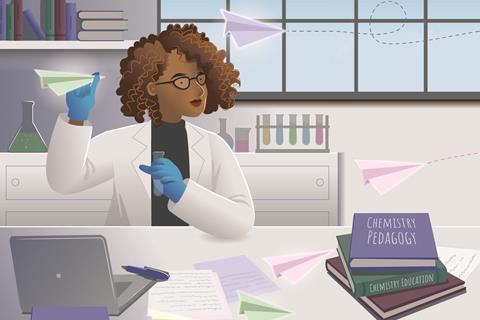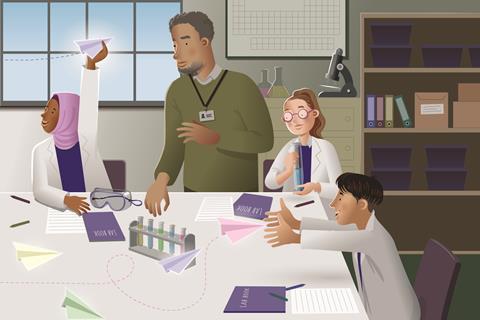10 guiding principles to help you maximise students’ outcomes from chemistry practicals

Chemistry education research is great for navigating our way to the teaching strategies that will have the most impact for our students. Engaging with research helps to ensure our practice is evidence-informed, while bridging the gap between researchers and teachers.
In their 2024 Chemistry Education Research and Practice journal paper, researcher Michael Seery and his colleagues synthesised research on effective practices in the chemistry laboratory into 10 guiding principles. Although their work focused on enhancing learning in undergraduate chemistry laboratories, the findings are just as relevant to students in the secondary school setting. Here are some ideas on how you can use these research-led ideas in your chemistry lessons to improve learners’ practical work and outcomes.
The principles
- Make your classroom accessible and inclusive
- Talk to other staff about the purpose of practicals
- Use pre-lab activities to check knowledge and skills
- Create time for discussion
- Discuss safety and sustainability
- Allocate roles to develop teamwork
- Provide opportunities to design activities
- Share success criteria and assess progress
- Provide feedback and the chance to act on it
- Allow students to display and share learning
In their 2024 article, chemistry education researcher Michael Seery and his colleagues synthesised research on effective practices in the chemistry laboratory into 10 guiding principles (rsc.li/47merFO). Although their work focused on enhancing learning in undergraduate chemistry laboratories, the findings are just as relevant to students in the secondary school setting. Here are ideas to use this research in your classroom practical work to improve your learners’ outcomes.
Principle 1: make your classroom accessible and inclusive
It’s so important the classroom is an accessible and inclusive environment for everyone, and what works for one student may not for another. Ask yourself if there is the potential for sensory overload, something autistic students and those with ADHD may experience. Can you use technology to support them? Replace labels with pictures of the apparatus that equipment cupboards contain and create an activity that will familiarise students with your classroom, and where resources/equipment are located. This will be very helpful to all students.
Principle 2: talk to other staff about the purpose of practicals
Are all teachers clear about the purposes of each practical activity? Are you aiming to develop higher-order thinking skills, develop transferable skills or promote effective outcomes? Avoid using practicals to teach concepts. You may need to clarify the intentions and desired learning at departmental meetings, and experienced colleagues will need to support novice teachers.
Principle 3: use pre-lab activities to check knowledge and skills
Practical tasks can overwhelm students’ working memory because there’s so much going on – instructions to follow, data to collect, observations to make and equipment to use, possibly for the first time. Cognitive overload can result in a reduced capacity for achieving the intended learning goals.
One way of minimising this is to use pre-laboratory activities to equip students with some knowledge or skills that they will require in the practical before they complete the activity. You can then be more confident that students have the required conceptual knowledge to understand the observations or measurements they make. For example, you could watch practical videos of new experimental techniques or carry out screen-based simulations before tackling a practical activity.
One way of minimising this is to use pre-laboratory activities to equip students with some knowledge or skills that they will require in the practical before they complete the activity. You can then be more confident that students have the required conceptual knowledge to understand the observations or measurements they make. For example, you could watch practical videos of new experimental techniques or carry out screen-based simulations before tackling a practical activity (rsc.li/3MFyypd).
Principle 4: allow discussion time
Practical activities offer opportunities for dialogue. Ensure there is plenty of time left after a practical to discuss the results and their meaning, and how they relate to the learning goals. For example, ask students to pool results on the board. You could spend time discussing errors and the similarities/differences between the results different groups obtain.
Ask questions to promote deeper thinking, for example, ‘Why are we heating with a water bath instead of a Bunsen?’, ‘What could be causing that colour change?’, or ‘If you could see at a submicroscopic level, what would you see happening in the beaker right now?’.
Encourage dialogue between students by adding prompts after different stages of a practical. Perhaps, ‘Discuss with your partner why filtration is carried out at this stage and note down what is in the filtrate and the residue.’

Principle 5: discuss safety and sustainability
You will risk assess classroom practicals long before the students set foot in the classroom, but you can take the opportunity to explicitly discuss safety issues with students. Doing a microscale practical? Talk to your class about why microscale is a safer and more sustainable method. Using a substitute for a copper salt? Discuss why you are trying to minimise copper waste. If you’re dealing with hydrochloric acid, for example, display safety information and lead a discussion on minimising risk. Ask, ‘At this concentration of hydrochloric acid, should we be wearing eye protection?’
You will risk assess classroom practicals long before the students set foot in the classroom, but you can take the opportunity to explicitly discuss safety issues with them and use student risk assessment worksheets (rsc.li/3MJcl9O). Doing a microscale practical (rsc.li/4d7Dspw)? Talk to your class about why microscale is a safer and more sustainable method. Using a substitute for a copper salt? Discuss why you are trying to minimise copper waste. If you’re dealing with hydrochloric acid, for example, display safety information and lead a discussion on minimising risk. Ask, ‘At this concentration of hydrochloric acid, should we be wearing eye protection?’
Principle 6: allocate roles to develop teamwork
Students in a science class often have the misconception that scientific discoveries are the work of a lone genius, working away in a laboratory. Dispel this notion with practical activities. Use group work and allocate students different roles to develop teamwork and demonstrate the importance of collaboration. Give each group a slightly different practical activity, then get them to pool results to form an overall conclusion to reiterate the collaborative nature of research.
Principle 7: provide opportunities to design activities
Before we incorporate creativity and open experimentation into practical work, it’s important to be clear on how students shouldn’t do things. Giving them carte blanche with chemicals and equipment, in the hope that they’ll somehow discover the desired learning goal, won’t develop creativity or inquiry skills. Instead, support students to develop the component skills of scientific inquiry, for example, hypothesis development, data evaluation and constructing conclusions. Involve students in determining the range of values of an independent variable, or selecting the number of measurements to make over a predetermined range, but ensure you consider students’ prior knowledge and skills before determining how much control to give them over the experiment.
Before we incorporate creativity and open experimentation into practical work, it’s important to be clear on how students shouldn’t do things. Giving them carte blanche with chemicals and equipment, in the hope that they’ll somehow discover the desired learning goal, won’t develop creativity or inquiry skills. Instead, support students to develop the component skills of scientific inquiry, for example, hypothesis development, data evaluation and constructing conclusions. Find more ideas on teaching science skills in our articles and resources (rsc.li/3AVf5Os). Involve students in determining the range of values of an independent variable, or selecting the number of measurements to make over a predetermined range, but ensure you consider students’ prior knowledge and skills before determining how much control to give them over the experiment.
Principle 8: share success criteria and assess progress
Share detailed success criteria with students as a tick list and use peer or self-assessment for students to make their own judgements. You could also get students to produce a scientific report, perhaps using a scaffolded writing frame with you gradually removing the structure. It is important that the assessment you use aligns with the learning goals and that it improves that learning. Consider a summative assessment if the skills developed contribute towards certification, but most assessments of practical activities that aim to find out if the experiment is having the desired impact (principle 2) will be formative.
Principle 9: provide feedback and the chance to act on it
Teachers have lots of opportunities to provide feedback on practicals. For example, how students are performing a particular laboratory skill, the quality of a report they produce or how well they work collaboratively with others.
It’s important that if you give feedback, students get the opportunity to act on it. Let them redraft a scientific report after feedback or repeat a skill until they achieve success. For example, reaching the end point of a titration. If we just provide the feedback but don’t give our students the opportunity to improve, there’s a good chance the whole experiment will be pointless.
Principle 10: allow students to display and share learning
There is usually plenty of scope for students to display their knowledge and understanding of scientific concepts and theories via written assessments and exams. However, there is often less opportunity for them to demonstrate learning from practical activities, which could contribute to students devaluing the learning altogether.
Research has shown that students often report they really enjoy practical work, but believe they aren’t actually learning anything. To avoid this misunderstanding, we need to allow students the opportunity to display what they’ve learned. Various methods will deliver the desired impact. Create a digital or physical logbook where students and/or you can document the skills achieved, for example. Or task them to create an academic-style poster to present and explain their work. Giving students regular opportunities to reflect on their learning from completing practical activities will also allow them to showcase their understanding.
Principle 10: allow students to display and share learning
There is usually plenty of scope for students to display their knowledge and understanding of scientific concepts and theories via written assessments and exams. However, there is often less opportunity for them to demonstrate learning from practical activities, which could contribute to students devaluing the learning altogether.
Research (bit.ly/3Zmk6tz) has shown that students often report they really enjoy practical work, but believe they aren’t actually learning anything. To avoid this misunderstanding, we need to allow students the opportunity to display what they’ve learned. Various methods will deliver the desired impact. Create a digital or physical logbook where students and/or you can document the skills achieved, for example (rsc.li/47nxoIg). Giving students regular opportunities to reflect on their learning from completing practical activities will also allow them to showcase their understanding.
There has been extensive research into lab work in chemistry, and these 10 guiding principles provide the ideal framework for classroom teaching. If you can implement these concepts in your school, you are giving your students the best chance of retaining the information they need to succeed in science.
Colin McGill is an associate professor in education at Edinburgh Napier University














No comments yet